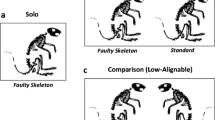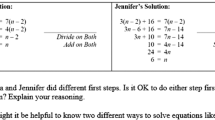Abstract
This study sought to address the problem of novices not being able to select the appropriate diagrams to suit given tasks. It investigated the usefulness of providing teaching sessions that involved active comparison of diagrams and review of lessons learnt following problem solving. Fifty-eight 8th grade participants were assigned to one of two instruction conditions. In both, traditional math classes were provided in which diagrams were used to explain how to solve math word problems. However, participants in the experimental group were additionally provided with sessions that required them to actively compare diagrams used, and consider and articulate the lessons they learnt from the problem solving exercises. The results showed that participants in the experimental condition subsequently constructed more appropriate diagrams in solving math word problems. In an assessment of conditional knowledge, these participants also provided more abstract and detailed descriptions about the uses of diagrams in problem solving.
An erratum to this chapter is available at http://dx.doi.org/10.1007/11783183_39.
Preview
Unable to display preview. Download preview PDF.
Similar content being viewed by others
References
Larkin, J.H., Simon, H.A.: Why a diagram is (sometimes) worth ten thousand words. Cognitive Science 11, 65–99 (1987)
Cheng, P.C.H.: Why diagrams are (sometimes) six times easier than words: benefit beyond locational indexing. In: Blackwell, A.F., Marriott, K., Shimojima, A. (eds.) Diagrams 2004. LNCS (LNAI), vol. 2980, pp. 242–254. Springer, Heidelberg (2004)
Mayer, R.E.: The promise of multimedia learning: using the same instructional design methods across different media. Learning and Instruction 13, 125–139 (2003)
Novick, L.R., Hurley, S.M.: Improving cross-content transfer in text processing by means of active graphical representation. To matrix, network, or hierarchy: That is the question. Cognitive Psychology 42, 158–216 (2001)
De Bock, D., Verschaffel, L., Janssens, D., Van Dooren, W., Claes, K.: Do realistic contexts and graphical representations always have a beneficial impact on students’ performance? Negative evidence from a study on modelling non-linear geometry problems. Learning and Instruction 13, 441–463 (2003)
Cheng, P.C.H.: Electrifying diagrams for learning: principles for complex representational systems. Cognitive Science 26, 685–736 (2002)
Koedinger, K.R., Terao, A.: A cognitive task analysis of using pictures to support pre-algebraic reasoning. In: Schunn, C.D., Gray, W. (eds.) Proceedings of the Twenty-Fourth Annual Conference of the Cognitive Science Society, pp. 542–547. Lawrence Erlbaum Associates, Mahwah (2002)
Stern, E., Aprea, C., Ebner, H.G.: Improving cross-content transfer in text processing by means of active graphical representation. Learning and Instruction 13, 191–203 (2003)
Cox, R.: Representation construction, externalised cognition and individual differences. Learning and Instruction 9, 343–363 (1999)
Dufour-Janiver, B., Bednarz, N., Belanger, M.: Pedagogical considerations concerning the problem of representation. In: Janvier, C. (ed.) Problems of representation in the teaching and learning of mathematics, pp. 110–120. Erlbaum, Hillsdale (1987)
Uesaka, Y.: Daisuubunsyoudainiokeru zuhyouno riyouwo unagasu youinto kainyuuhouhouno kentou [Investigating the factors and teaching method for promoting the spontaneous use of diagrams in mathematical word problems]. Masters Thesis. The University of Tokyo, Japan (2003) (unpublished)
Uesaka, Y., Manalo, E., Ichikawa, S.: What kinds of perceptions and daily learning behaviors promote students’ use of diagrams in mathematics problem solving? (submitted paper)
Cox, R.: Analytical reasoning with multiple external representations. Unpublished Ph.D Thesis. The University of Edinburgh, United Kingdom (1996)
Norman, D.A.: Things that make us smart: Defending human attributes in the age of the machine. Perseus Books, Cambridge (1993)
Grawemeyer, B., Cox, R.: The effect of knowledge-of-external-representations upon performance and representational choice in a database query task. In: Blackwell, A.F., Marriott, K., Shimojima, A. (eds.) Diagrams 2004. LNCS (LNAI), vol. 2980, pp. 351–354. Springer, Heidelberg (2004)
Novick, L.R., Hurley, S.M., Francis, F.: Evidence for abstract, schematic knowledge of three spatial diagram representations. Memory and Cognition 27, 288–308 (1999)
Gick, M.L., Holyoak, K.J.: Schema induction and analogical transfer. Cognitive Psychology 15, 1–38 (1983)
Suzuki, H.: Justification of analogy by abstraction. In: Holyoak, K., Gentner, D., Kokinov, B. (eds.) Advances in Analogy Research: Integration of Theory and Data from the Cognitive, Computational, and Neural Sciences, pp. 373–380. New Bulgarian University, Sofia, Bulgaria (1998)
Catrambone, R., Holyoak, K.J.: Overcoming Contextual Limitations on Problem-Solving Transfer. Journal of Experimental Psychology: Learning, Memory, and Cognition 15, 1147–1156 (1989)
Bransford, J.D., Franks, J.J., Vye, N.J., Sherwood, R.D.: New approaches to instruction: because wisdom can’t be told. In: Vosniadou, S., Ortony, A. (eds.) Similarity and analogical reasoning, pp. 470–497. Cambridge University Press, Cambridge (1989)
Ichikawa, S.: Kyoukunkinou’no tokutyouto sinrigakutekisyokenkyuutono kanren [The feature of ‘Lesson Induction’ and the relation to the psychological research]. In: Ichikawa, S. (ed.) Gakusyuuwo sasaeru ninnti-kaunsering -Sinrigakuto kyouikuno aratana setten [Cognitive counseling that supports learning: A new approach bridging psychology and education], pp. 52–61. Brain Press, Tokyo (1993)
Ichikawa, S.: Cognitive counseling to improve students’ metacognition and cognitive skills. In: Shwalb, D.W., Nakazawa, J., Shwalb, B.J. (eds.) Applied developmental psychology: theory, practice, and research from Japan, pp. 67–87. Information Age Publishing, Greenwich Conn (2005)
Terao, A., Kusumi, T., Ichikawa, S.: Solution compression in mathematical problem solving: Acquiring abstract knowledge that promotes transfer. In: Shafto, M.G., Langley, P. (eds.) Proceedings of the 19th Annual Conference of the Cognitive Science Society, pp. 733–738. Lawrence Erlbaum Associates, Mahwah (1997)
Ellis, S., Davidi, I.: After-event reviews: Drawing lessons from successful and failed experience. Journal of Applied Psychology 90, 857–871 (2005)
Author information
Authors and Affiliations
Editor information
Editors and Affiliations
Rights and permissions
Copyright information
© 2006 Springer-Verlag Berlin Heidelberg
About this paper
Cite this paper
Uesaka, Y., Manalo, E. (2006). Active Comparison as a Means of Promoting the Development of Abstract Conditional Knowledge and Appropriate Choice of Diagrams in Math Word Problem Solving. In: Barker-Plummer, D., Cox, R., Swoboda, N. (eds) Diagrammatic Representation and Inference. Diagrams 2006. Lecture Notes in Computer Science(), vol 4045. Springer, Berlin, Heidelberg. https://doi.org/10.1007/11783183_25
Download citation
DOI: https://doi.org/10.1007/11783183_25
Publisher Name: Springer, Berlin, Heidelberg
Print ISBN: 978-3-540-35623-3
Online ISBN: 978-3-540-35624-0
eBook Packages: Computer ScienceComputer Science (R0)




